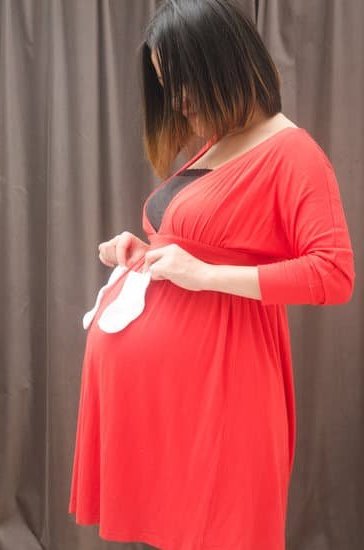Spotting during pregnancy can be a cause for concern or confusion for many women. Understanding the potential significance of spotting in relation to pregnancy is crucial in order to address any worries or questions that may arise. Spotting, which refers to light bleeding that occurs outside of the regular menstrual cycle, can indeed be a sign of pregnancy.
Spotting can occur for various reasons, not all of which are related to pregnancy. It is important to distinguish between normal and abnormal spotting in order to determine if it might be an early indicator of pregnancy. Normal spotting can be attributed to implantation bleeding, hormonal changes, or cervical irritation, while abnormal spotting may indicate underlying health issues.
In the context of pregnancy, spotting has the potential to signify early signs of conception. This phenomenon occurs when the fertilized egg attaches itself to the uterine lining, causing minor bleeding known as implantation bleeding. Recognizing how spotting can indicate possible pregnancy allows individuals to be more attuned to their body’s signals and seek appropriate medical guidance if needed.
Understanding Spotting
Spotting, often referred to as light bleeding, is a common phenomenon that can occur for various reasons. In general, spotting is defined as light vaginal bleeding that occurs outside of your regular menstrual cycle. This can manifest as small amounts of blood on toilet paper after urination or as a few drops of blood in your underwear. It is important to understand the causes of spotting in order to distinguish between normal occurrences and signs of potential health concerns.
To better grasp the concept of spotting, it is essential to consider the various causes behind this phenomenon. Some common reasons for spotting include hormonal fluctuations, ovulation, birth control use, or minor trauma to the vaginal area. Additionally, infections such as yeast infections or sexually transmitted diseases can also lead to spotting. It is worth noting that while spotting can be alarming for some individuals, it is not always indicative of a serious medical issue.
Within the context of pregnancy, spotting can serve as an early sign of conception. Implantation bleeding, which occurs when the fertilized egg attaches itself to the uterine lining, can result in light spotting around ten to fourteen days after conception. This type of spotting is typically lighter in flow and duration compared to menstruation.
Thus, for those wondering “can spotting be a sign of pregnancy,” it is crucial to consider other accompanying symptoms such as nausea or breast tenderness before drawing any conclusions. Here are some key points to consider about understanding spotting:
- Spotting may be caused by hormonal changes during ovulation.
- Minor trauma or infections can also lead to spotting.
- Light bleeding during implantation can be a sign of early pregnancy.
In summary, understanding the definition and causes of spotting in general provides important insights into how this occurrence can potentially serve as a sign of pregnancy While there are various explanations for spotting that do not relate to pregnancy, being aware of its occurrence in relation to conception allows individuals to better navigate their reproductive health journey.
If you are experiencing unusual bleeding or have concerns about potential pregnancy, consulting with a healthcare provider is recommended for personalized guidance and care.
Normal vs Abnormal Spotting
Spotting during pregnancy can cause a great deal of concern for expectant mothers. It is important to understand the difference between normal spotting and abnormal spotting to determine whether it is a sign of pregnancy or something more serious.
Normal spotting, also known as implantation bleeding, typically occurs around the time of expected menstruation and is often lighter in flow and shorter in duration than a typical period. This type of spotting can be a sign of early pregnancy as the fertilized egg attaches itself to the uterine lining.
On the other hand, abnormal spotting during pregnancy may indicate underlying issues such as infection, hormonal imbalances, or even complications with the pregnancy itself. Abnormal spotting can present as heavier bleeding, accompanied by cramping or abdominal pain. It is essential for pregnant women experiencing abnormal spotting to seek medical attention promptly to rule out any potential risks to their health or the health of their baby.
It is crucial for pregnant women to pay close attention to their bodies and monitor any changes or abnormalities in vaginal discharge or bleeding. While spotting can indeed be a sign of pregnancy, it is not always indicative of a healthy pregnancy.
Consulting with a healthcare provider is essential to receive appropriate guidance and care throughout this delicate journey. Remember, every woman’s experience with spotting during pregnancy can vary, so it is better to err on the side of caution and seek professional advice when in doubt about any symptoms experienced during this time.
How Spotting Can Be a Sign of Pregnancy
Spotting, also known as light bleeding, can indeed be a sign of pregnancy for some women. While it may cause worry and uncertainty, spotting in the early stages of pregnancy is actually quite common and can be a normal occurrence. Understanding how spotting can indicate early pregnancy can help ease concerns and provide reassurance to expecting mothers.
1. Implantation Bleeding: One of the primary reasons why spotting can be a sign of pregnancy is due to implantation bleeding. This occurs when the fertilized egg attaches itself to the uterine lining, causing some light bleeding. Implantation bleeding typically occurs around 6-12 days after conception, which aligns with the timing of when a woman would expect her period. It is usually lighter in flow than a typical period and may be accompanied by mild cramping.
2. Hormonal Changes: Another reason why spotting may signal pregnancy is related to hormonal changes within the body. When a woman conceives, her body produces higher levels of hormones such as estrogen and progesterone to support the pregnancy. These hormonal fluctuations can sometimes lead to breakthrough bleeding or spotting. The increase in blood flow to the pelvic area during pregnancy can also contribute to occasional light bleeding.
3. Cervical Changes: During early pregnancy, changes in the cervix’s vascularization and sensitivity can make it more prone to bleeding upon slight irritation or contact. This heightened sensitivity can result in spotting that is not necessarily indicative of any complications but rather a normal part of the physiological changes occurring during pregnancy.
Overall, while spotting can serve as an indicator of early pregnancy for some women, it is essential to remember that not all instances of spotting are related to gestation. Understanding the potential causes behind spotting can help differentiate between normal occurrences and issues that require medical attention.
Other Possible Explanations for Spotting
Spotting can be a sign of pregnancy, but it is essential to consider other possible explanations for this common occurrence. One of the reasons for spotting unrelated to pregnancy could be hormonal fluctuations. Changes in hormone levels, such as those due to birth control pills or hormonal imbalances, can lead to spotting between periods. Additionally, factors like stress, excessive exercise, or certain medications can also contribute to irregular bleeding.
Another potential cause of spotting that is not related to pregnancy is cervical or uterine polyps. These growths in the reproductive organs are usually benign but can cause unexpected bleeding. Infections or sexually transmitted diseases (STDs) can also result in spotting outside of a regular menstrual cycle. Conditions like pelvic inflammatory disease (PID) or yeast infections may lead to abnormal vaginal bleeding.
It’s essential to keep in mind that certain medical conditions like thyroid disorders or polycystic ovary syndrome (PCOS) can manifest with symptoms like irregular bleeding or spotting. In some cases, cervical cancer or other gynecological issues may present with abnormal vaginal discharge and bleeding. If you experience persistent or severe spotting that cannot be attributed to early pregnancy, it is crucial to consult a healthcare provider for a proper evaluation and diagnosis.
| Possible Explanations for Spotting | Description |
|---|---|
| Hormonal Fluctuations | Changes in hormone levels from various sources leading to irregular bleeding. |
| Cervical/Utuerine Polyps | Benign growths in reproductive organs causing unexpected bleeding. |
| Infections/STDs | Conditions like PID or yeast infections contributing to abnormal vaginal bleeding. |
When to Consult a Doctor
Spotting during pregnancy can often be a cause for concern for many women. While it is not uncommon to experience light bleeding or spotting in early pregnancy, it is crucial to understand when this could indicate a more serious issue that requires medical attention. Knowing when to consult a doctor can help ensure the health and safety of both the mother and the baby.
Signs That Warrant Medical Attention
If you are pregnant and experiencing spotting along with severe abdominal pain, cramping, dizziness, or passing large clots, it is essential to seek medical help immediately. These symptoms could indicate a possible complication such as an ectopic pregnancy or a miscarriage. Additionally, if the spotting persists for more than a few days or if you have a history of complications in previous pregnancies, it is advisable to consult with your healthcare provider promptly.
Importance of Regular Prenatal Care
Regular prenatal check-ups are vital during pregnancy, especially if you are experiencing any unusual symptoms like spotting. Your healthcare provider
Seeking Reassurance and Guidance
It is understandable to feel anxious or worried about spotting during pregnancy. However, it is essential not to ignore any signs that may indicate a problem. Consulting with your doctor
Personal Experiences
Spotting during pregnancy can be a source of anxiety and concern for many women. While it is not uncommon for some individuals to experience spotting in early pregnancy, the question of “can spotting be a sign of pregnancy” may linger in the minds of those who are unsure about the possible implications.
Spotting, which refers to light bleeding that occurs outside of regular menstrual periods, can sometimes indicate implantation bleeding – a common occurrence when the fertilized egg attaches to the uterine wall.
For some women, spotting as a sign of pregnancy may manifest as light pink or brown discharge that appears around the time of their expected period. While this type of spotting is usually considered normal and harmless, it can also cause worry and uncertainty about the health of the pregnancy.
Real-life stories from women who have experienced spotting as a sign of pregnancy can provide reassurance and support to others going through a similar situation. These personal experiences offer insights into different perspectives and outcomes related to spotting during early pregnancy.
Understanding that every woman’s body and pregnancy journey are unique can help alleviate some concerns surrounding spotting as a sign of pregnancy. It is essential to remember that while spotting can indeed be an indicator of implantation or early pregnancy, it is not always the case.
Consulting with a healthcare provider is crucial if any unusual bleeding or spotting occurs during pregnancy, as it could also signify other underlying issues that require medical attention. Taking proactive steps towards monitoring one’s health and seeking professional guidance when needed can contribute to a safer and more informed pregnancy journey.
| Personal Experience | Outcome |
|---|---|
| Woman A | Spotting as a sign of pregnancy led to successful full-term delivery. |
| Woman B | Experienced heavy spotting but received timely medical intervention which resulted in a healthy baby. |
Tips for Coping With Spotting
Spotting during pregnancy can be a cause for concern and may lead to anxiety and stress for expectant mothers. It is important to understand how to cope with this common symptom and manage the related emotions effectively. Here are some tips and advice on how to navigate through spotting during pregnancy:
Stay Calm and Stay Informed
First and foremost, it is crucial to stay calm when experiencing spotting during pregnancy. While it can be alarming, remember that spotting is not uncommon in early pregnancy. Educate yourself about the possible reasons for spotting and familiarize yourself with what is considered normal versus abnormal. Consult reliable sources such as healthcare professionals or reputable websites to gather accurate information.
Communicate With Your Healthcare Provider
Do not hesitate to reach out to your healthcare provider if you experience spotting during pregnancy. They can provide guidance, reassurance, and perform necessary examinations to ensure the well-being of both you and your baby. Open communication with your healthcare provider is essential in managing any concerns or worries you may have.
Practice Self-Care
Taking care of yourself physically and emotionally is crucial during pregnancy, especially when dealing with symptoms like spotting. Practice self-care activities that help reduce stress levels such as gentle exercise, meditation, deep breathing techniques, or engaging in hobbies that bring you joy. Surround yourself with a supportive network of family and friends who can provide emotional support during this time.
By following these tips for coping with spotting during pregnancy, you can spot better manage the associated anxiety and stress. Remember that each pregnancy journey is unique, and seeking support from your healthcare provider will help ensure a safe and healthy outcome for both you and your baby.
Conclusion
In conclusion, spotting can indeed be a sign of pregnancy for some women. While it is important to remember that not all instances of spotting signify pregnancy, it is necessary to consider the possibility, especially when the spotting occurs around the time of an expected menstrual cycle. Understanding the causes and differences between normal and abnormal spotting can help individuals navigate their concerns with more knowledge and clarity.
It is crucial for individuals who suspect they might be pregnant due to spotting to consult a healthcare professional for confirmation and appropriate guidance. Early detection of pregnancy is vital for receiving proper prenatal care and ensuring the well-being of both the mother and the developing fetus. Doctors can provide accurate information, conduct necessary tests, and offer support throughout the pregnancy journey.
Overall, while spotting can potentially serve as a sign of pregnancy, it is only one indicator among many possible symptoms. It is always recommended to seek professional medical advice when experiencing any abnormal bleeding or other concerning symptoms during pregnancy. By prioritizing health and seeking timely medical attention, individuals can take proactive steps towards a safe and healthy pregnancy journey.
Frequently Asked Questions
What Does the Spotting Look Like in Early Pregnancy?
Spotting in early pregnancy can vary from woman to woman, but it is typically light pink or brownish in color. It may appear as a few drops on toilet paper or a light discharge.
How Soon Does Pregnancy Spotting Start?
Pregnancy spotting can start as early as 6-12 days after conception when the fertilized egg implants into the uterus. However, it is more commonly seen around the time of the expected period, usually within the first trimester.
How Do I Know if It’s Pregnancy Spotting or Period?
Differentiating between pregnancy spotting and a period can be challenging because they may appear similar. However, pregnancy spotting is usually lighter and shorter in duration compared to a normal period. Additionally, the timing and consistency of the bleeding can offer clues – implantation bleeding occurs earlier than a regular period and may be lighter in flow.

Welcome to my fertility blog. This is a space where I will be sharing my experiences as I navigate through the world of fertility treatments, as well as provide information and resources about fertility and pregnancy.





